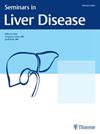Adherence in HCV Treatment: What We Know.
IF 4.3
3区 医学
Q1 GASTROENTEROLOGY & HEPATOLOGY
引用次数: 0
Abstract
Although therapy with direct-acting antiviral (DAA) agents achieves high HCV cure rates and is forgiving of missed doses, certain patient populations, such as people who inject drugs (PWID), are often denied therapy because of a perceived high risk of nonadherence. However, a relationship between adherence to DAAs for various patient populations and efficacy has not been well defined. The lack of a standardized method for evaluating adherence complicates making comparisons between studies, making it difficult to develop and implement novel measures that may improve adherent behavior. Traditional methods for assessing adherence may overestimate medication adherence, while newer, technology-based methods may assist with accurately assessing and maintaining patient adherence to therapy. Data demonstrate that special populations of patients with HCV, such as PWID, can be successfully treated, with relatively high rates of sustained virologic response (SVR) despite less-than-optimal adherence. While rates of adherence, and subsequently SVR, can be improved, antiviral therapy should not be withheld because of fear of nonadherence. This paper addresses medication adherence and forgiveness of DAA regimens, such as sofosbuvir/velpatasvir and glecaprevir/pibrentasvir, in different patient populations with HCV. Considerations in evaluating adherence in HCV therapy and available methods for assessing adherence are detailed.坚持 HCV 治疗:我们所知道的。
尽管使用直接作用抗病毒(DAA)药物治疗可实现较高的 HCV 治愈率,而且不会出现漏服的情况,但注射吸毒者(PWID)等特定患者群体往往因认为不坚持治疗的风险较高而拒绝接受治疗。然而,不同患者群体对 DAAs 治疗的依从性与疗效之间的关系尚未得到很好的界定。由于缺乏评估依从性的标准化方法,使得研究间的比较变得复杂,从而难以开发和实施可改善依从性行为的新措施。传统的依从性评估方法可能会高估用药依从性,而以技术为基础的新方法可能有助于准确评估和维持患者的治疗依从性。数据显示,HCV 患者中的特殊人群(如吸毒者)可以成功接受治疗,尽管依从性不够理想,但持续病毒学应答(SVR)率相对较高。虽然依从性以及随后的 SVR 率可以提高,但不应因为担心不依从性而放弃抗病毒治疗。本文探讨了索非布韦/韦帕他韦和格列卡普瑞韦/皮布特韦等 DAA 方案在不同 HCV 患者群体中的用药依从性和耐受性。文中详细介绍了评估 HCV 治疗依从性的注意事项和可用的依从性评估方法。
本文章由计算机程序翻译,如有差异,请以英文原文为准。
求助全文
约1分钟内获得全文
求助全文
来源期刊

Seminars in liver disease
医学-胃肠肝病学
CiteScore
8.20
自引率
2.40%
发文量
38
期刊介绍:
Seminars in Liver Disease is a quarterly review journal that publishes issues related to the specialties of hepatology and gastroenterology.
As the premiere review journal in the field, Seminars in Liver Disease provides in-depth coverage with articles and issues focusing on topics such as cirrhosis, transplantation, vascular and coagulation disorders, cytokines, hepatitis B & C, Nonalcoholic Steatosis Syndromes (NASH), pediatric liver diseases, hepatic stem cells, porphyrias as well as a myriad of other diseases related to the liver. Attention is also given to the latest developments in drug therapy along with treatment and current management techniques. Seminars in Liver Disease publishes commissioned reviews. Unsolicited reviews of an exceptional nature or original articles presenting remarkable results will be considered, but case reports will not be published.
 求助内容:
求助内容: 应助结果提醒方式:
应助结果提醒方式:


